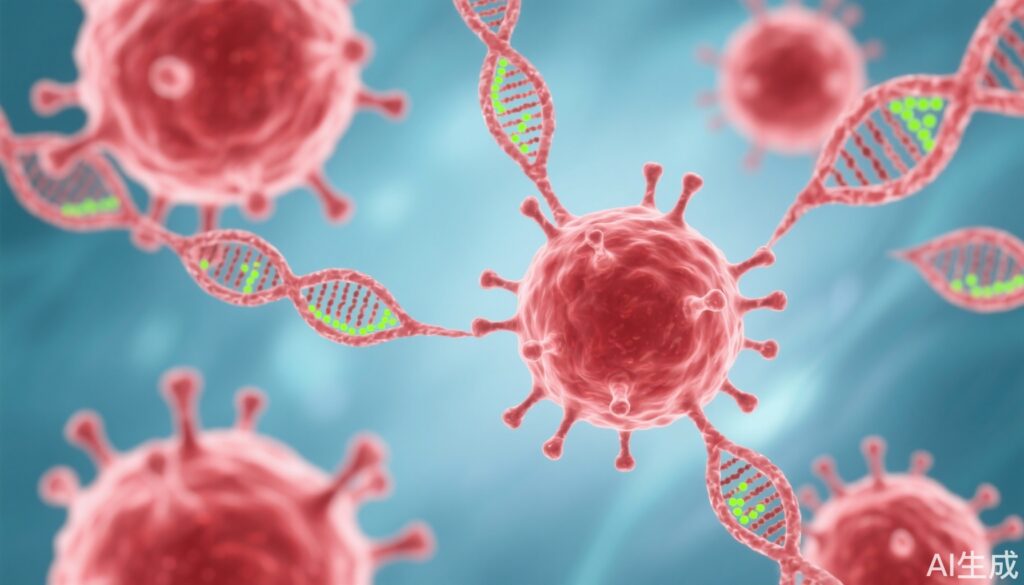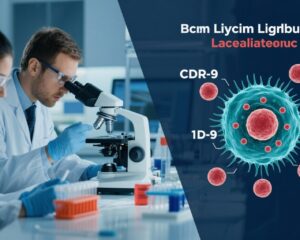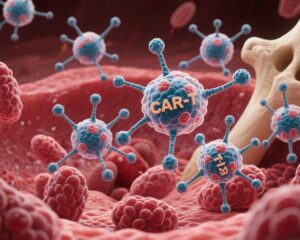Highlight
1. Among patients undergoing CD19 or BCMA CAR T therapy for NHL or MM, 24% exhibited clonal hematopoiesis (CH) prior to infusion.
2. Presence of CH mutations was associated with a significantly increased risk of developing severe cytokine release syndrome (grade ≥2 CRS).
3. CH was not linked to immune effector cell-associated neurotoxicity syndrome (ICANS), progression-free survival (PFS), or overall survival (OS) at one year.
4. Pre-treatment CH might serve as a predictive biomarker for CRS severity, enabling personalized prophylaxis strategies.
Study Background and Disease Burden
Chimeric antigen receptor T-cell (CAR T) therapy targeting CD19 or B-cell maturation antigen (BCMA) has transformed the treatment landscape for relapsed or refractory non-Hodgkin lymphoma (NHL) and multiple myeloma (MM). Despite impressive therapeutic efficacy, CAR T therapy is frequently complicated by inflammatory toxicities including cytokine release syndrome (CRS) and immune effector cell-associated neurotoxicity syndrome (ICANS). These toxicities can range from mild to life-threatening, often requiring intensive management. Additionally, patients may experience prolonged cytopenias post-CAR T infusion, adversely affecting outcomes and quality of life.
Inflammation both prior to and following CAR T infusion is recognized as a major contributor to these toxicities. Clonal hematopoiesis (CH), defined by the clonal expansion of hematopoietic stem cells harboring somatic mutations, is increasingly recognized for its role in systemic inflammation. CH-related mutations, such as those in DNMT3A, have been shown to upregulate inflammasome pathways and potentiate inflammatory responses. However, the relationship between pre-existing CH and CAR T therapy-related toxicities including CRS, ICANS, and prolonged cytopenias has not been clearly defined.
Study Design
This retrospective cohort study included 62 patients with NHL or MM treated with either CD19- or BCMA-directed CAR T therapy from 2017 to 2022 at City of Hope. Importantly, the cohort was predominantly transplant-naïve, providing a relatively homogenous population regarding prior therapy exposure.
Pre-CAR T peripheral blood mononuclear cells (PBMCs), frozen before infusion (94% collected within 30 days prior to CAR T), were utilized for DNA extraction using the QIAamp DNA Mini Kit (Qiagen). Targeted deep sequencing was performed on a 108-gene panel known to harbor CH-associated mutations, at a depth of 1000x sequencing coverage. Clonal hematopoiesis was defined as the presence of pathogenic somatic variants with variant allele frequency (VAF) ≥2%.
Multivariable logistic regression models assessed associations between CH presence and key clinical outcomes, including maximal grade of CRS and ICANS (graded per standard criteria), absolute neutrophil count (ANC) recovery at days +30 and +60, and clinical outcomes including one-year progression-free survival (PFS) and overall survival (OS). Covariates included age at CAR T, baseline ANC, sex, race, CAR-HEMATOTOX score, lactate dehydrogenase (LDH) levels, bridging therapy use, and number of prior therapy lines.
Key Findings
Of the 62 patients studied, 15 (24%) harbored at least one pathogenic CH mutation prior to CAR T infusion. Among these, DNMT3A mutations were most common, and a subset (29%) of detected mutations had VAFs exceeding 10%, indicative of substantial clonal burden. Notably, 13% of mutated patients had two or more concurrent CH mutations.
Patients with CH exhibited a significantly increased incidence of grade ≥2 CRS compared to those without CH (60% vs. 28%, p = 0.03). Multivariable analysis confirmed the association, yielding an odds ratio (OR) of 3.9 (95% confidence interval [CI] 1.2–13.2, p = 0.027). This indicates that CH presence nearly quadruples the risk of severe CRS.
Baseline ANC was higher in the CH group and correlated with delayed ANC recovery (p = 0.02). Nonetheless, after adjusting for baseline ANC, CH status did not significantly impact delayed neutrophil recovery at days +30 or +60 (adjusted OR 0.37, 95% CI 0.09–1.5, p = 0.17), suggesting other factors contribute to prolonged cytopenias.
No statistically significant association was found between CH and ICANS occurrence or severity, nor were there differences in 1-year PFS or OS between CH and non-CH groups.
Expert Commentary
This study illuminates a novel link between clonal hematopoiesis and the severity of cytokine release syndrome in the context of CAR T-cell therapy. The findings are biologically plausible given prior evidence that CH mutations enhance inflammasome activity and pro-inflammatory cytokine production, potentially priming patients for exaggerated immune responses upon CAR T infusion.
While CH did not appear to influence neurotoxicity or survival outcomes within one year, its effect on CRS severity may have important clinical implications. CRS is a major driver of morbidity and resource use post-CAR T therapy, and recognizing patients at higher risk could guide stratified monitoring or prophylaxis—such as earlier use of IL-6 receptor antagonists or corticosteroids.
Limitations exist, including the moderate sample size and retrospective design. The lack of association with survival endpoints might be a reflection of sample size or underlying disease heterogeneity. The predominance of transplant-naïve patients differentiates this cohort from many CAR T studies and may influence generalizability. Additionally, published guidelines do not currently include CH as a risk factor for CRS, underscoring the novelty and need for validation of these findings.
Future translational research should investigate mechanistic pathways linking CH-mutated myeloid cells to cytokine storm development, potentially identifying novel therapeutic targets. Larger prospective cohorts should validate CH as a biomarker and assess whether pre-emptive interventions based on CH status improve CAR T safety without compromising efficacy.
Conclusion
Clonal hematopoiesis is a common finding in patients with NHL or MM undergoing CD19 or BCMA CAR T therapy and independently associates with a greater risk of developing severe cytokine release syndrome. Identification of CH prior to CAR T infusion may serve as an important biomarker for CRS risk stratification, informing clinical decisions about monitoring and prophylactic strategies to mitigate toxicities. Ongoing validation studies and mechanistic investigations will be critical to incorporate CH assessment into CAR T clinical workflows and to optimize patient outcomes.
References
Goldsmith SR, Shouse G, Wong FL, Bosworth A, Iukuridze A, Chen S, Rhee JW, Mei M, Htut M, Janakiram M, Forman SJ, Pillai R, Budde LE, Armenian SH. Clonal Hematopoiesis is Associated With Severe Cytokine Release Syndrome in Patients Treated With Chimeric Antigen Receptor T-Cell (CART) Therapy. Transplant Cell Ther. 2024 Sep;30(9):927.e1-927.e9. doi: 10.1016/j.jtct.2024.06.008. Epub 2024 Jun 11. PMID: 38871057.



